SAVE THE DATE:
Evidentiary hearing in Eric King’s criminal case
October 14, 2021 9:30am
Courtroom A801
Alfred A. Arraj United States Courthouse 901 19th St, Denver, CO 80294.
Wear court clothes and bring identification.
PLEASE SHARE.
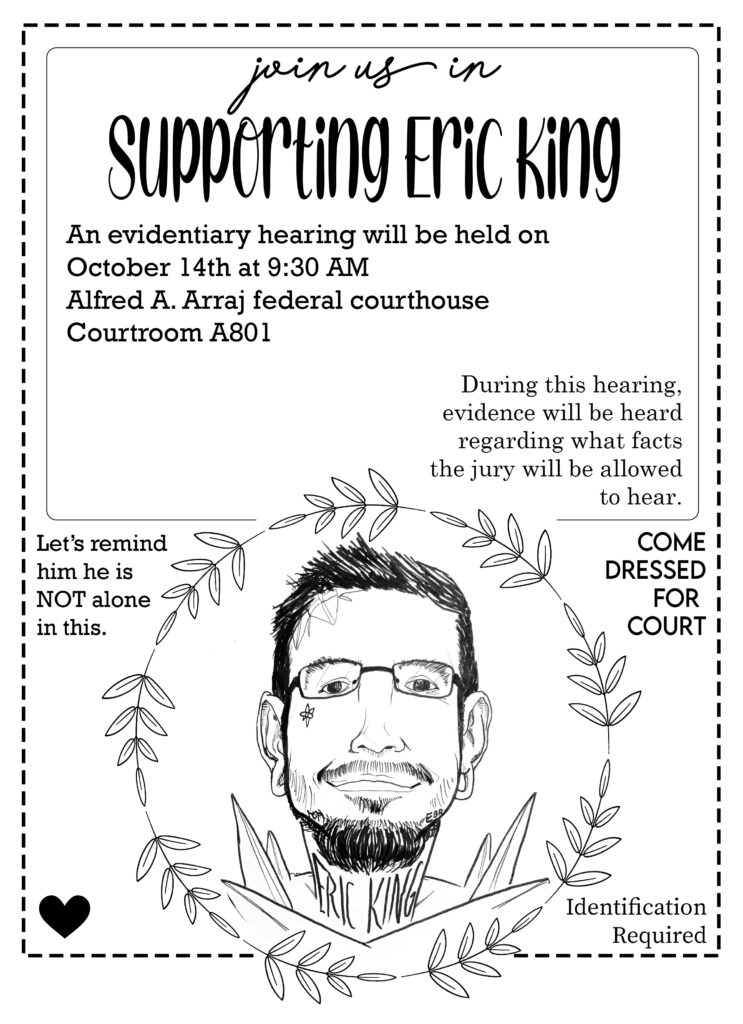
SAVE THE DATE:
Evidentiary hearing in Eric King’s criminal case
October 14, 2021 9:30am
Courtroom A801
Alfred A. Arraj United States Courthouse 901 19th St, Denver, CO 80294.
Wear court clothes and bring identification.
PLEASE SHARE.

In court filings, a legal nonprofit says guards in a federal prison tortured Eric King and then attempted to cover it up.
By Ella Fassler in VICE News
In 2014, anti-fascist activist Eric King was sentenced to 10 years in prison for throwing Molotov cocktails at a politician’s empty office in solidarity with the Black liberation uprisings in Ferguson, Missouri. Now, after years behind bars, King and his lawyers say that he was assaulted and tortured by prison guards—and that the Bureau of Prisons destroyed video evidence.
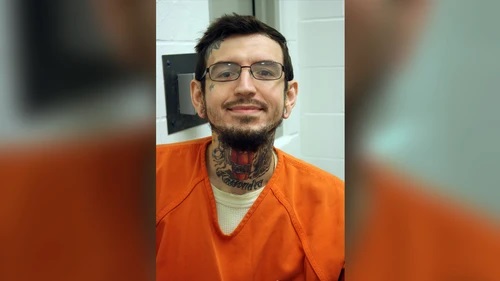
According to new motions to dismiss filed by the Civil Liberties Defense Center (CLDC), a legal nonprofit, BOP prison staff attacked King after leading him into a small, off-camera storage closet, then deleted video evidence, and may have misrepresented facts about the incident to the FBI. King’s attorneys also claim officers tied him to a four-point restraint device for approximately five hours, and then proceeded to interrogate him despite his asserting his constitutional right to counsel. King admitted to defending himself against Wilcox during the interrogation.
The case raises larger questions about the extent to which surveillance footage behind bars is manipulated, destroyed, or circumvented at the expense of incarcerated defendants. “All of these surveillance devices are controlled by those who it would also potentially expose,” Bianca Tylek of Worth Rises, an advocacy organization working to dismantle the prison industry, told Motherboard.
King was originally set to be released in 2023, but now faces additional charges accusing him of assaulting a federal officer, which could tack on 20 years to his initial 10-year sentence. Up until the incident, which documents say occurred on August 17, 2018, King was a yoga instructor at the prison and had managed to keep a relatively clean record.
He was a week away from being sent to a low-security facility. He hadn’t had a single shot. He had exemplary conduct. He had a good job,” Lauren Regan, King’s lead attorney, told Motherboard. “He was seeing his family every week. In terms of doing your time, he was in a really good place at the time that this occurred.” But now, Regan said, she has never had a client where she “feared so deeply just for their very survival.”
King has been held in solitary confinement for about three years, without access to snail mail or phone calls outside of communications with his immediate family and attorneys. And, according to a lawsuit filed by the CLDC on his behalf, the BOP has colluded with white supremacists by staging assaults and bunking him with members of white supremacist gangs.
The switch flipped after King sent an email to his wife wherein he made light of an unrelated assault on a prison guard. Afterwards, Lieutenant Donald Wilcox and Officer Jefferey Kammrad took him into a crowded, 8.5 by 11 foot room full of cleaning supplies—to “interview” him about the email, they claimed. After Wilcox asked Kammrad to leave the closet, according to the lawsuit, Wilcox cursed at King, threatened him, called him a terrorist, and punched him in the face twice. King claims he hit Wilcox back in self-defense, while Wilcox told the FBI King struck him first without any provocation.
Two days after the alleged assault, King’s attorney at the time submitted a request to preserve evidence of all video footage taken before and after the incident. However, an FBI memorandum recently uncovered by King’s attorneys revealed that the BOP destroyed footage of King shortly after the assault because “King was being complaint [sic] at the time.”
The discovery process also revealed one lieutenant and one nurse appear to have misrepresented facts to the FBI by claiming they did not interact with King while he was in four-point restraints. Their own paperwork contradicts their statements, according to evidence presented in the new filings.
While reviewing footage of King in four-point restraints, King’s attorneys noticed that the video was edited. “When we started forcing the U.S. Attorney’s Office to turn over [the] video, we were able to ascertain that there were cuts where the video clearly stopped and then started up,” Regan said. “For instance, at one point, he has a certain type of clothing on and the next frame, they’ve cut that clothing off of him, and now he’s in nothing but boxers. And there was no acknowledgement that the cameras were started and stopped.” At least two hours of footage of King in four-point restraints is missing.
One guard suffocated King while he was in the four-point restraint by putting his hands over King’s mouth, according to King’s civil suit. Then multiple guards allegedly taunted, insulted him, and threatened to have him raped by other incarcerated people, calling it “street justice” and “what he deserved.” None of this was documented on camera.
The Bureau of Prisons acknowledged Motherboard’s request for comment, but stated the agency does not comment on pending litigation. The Offices of the United States Attorneys and the government’s attorney, Aaron Teitelbaum, did not respond to Motherboard’s request by the time of publication. In court filings, the U.S. government admitted that it destroyed footage but said it did so within the bounds of its existing video retention policy and asked a judge to not move forward with an evidentiary hearing. “The unpreserved video of defendant behaving in a compliant manner between the entrance to the SHU and his holding cell was not relevant to this case, let alone exculpatory,” a U.S. attorney wrote.
On Tuesday, Judge William J. Martinez ordered an evidentiary hearing in response to factual disputes surrounding King’s interrogation and possible Fifth Amendment violations, delaying a trial which was originally scheduled for October 12. If King’s motions to dismiss are denied, a trial is likely to be scheduled for late October or November, where a jury will be asked to weigh the evidence. But people who are already convicted of crimes face a steep disadvantage in court, Regan said. “It’s so hard to convince jurors that people with felony convictions deserve to be believed,” she told Motherboard, “especially when you’ve got a shiny badge and this Lieutenant saying that he’s worked for the Bureau of Prisons for 20 years, you know, and this is just a terrorist…I mean, it’s just such an uphill battle.”
Since King’s character is at the heart of the case, any evidence showing King to be compliant or non-combative before, during, or shortly after the incident inside of the storage closet could be considered “exculpatory evidence”—legalese for evidence that may prove a defendant’s innocence.
“If Mr. King is fighting, resisting or otherwise out of control on the video, a jury might infer he was aggressive and may have instigated violence against Wilcox in the closet,” Regan argued in a motion to dismiss. “[B]ut on the other hand if King is compliant and not resisting in the immediate aftermath, a jury may infer that he merely defended himself in response to an assault by staff. The video is key to establishing this question before the jury.” The video could have also been used to impeach a government witness, Regan argued, since some guards claimed King was acting aggressively and resisting.
Teitelbaum argued that King’s attorneys overstated the seriousness of the alleged government misconduct and contended that the conditions of confinement should be excluded during trial. The off-camera alleged assault, Teitelbaum argued, is the only relevant part of the case. “Even assuming that such video is indeed missing, defendant fails to explain how additional video of him lying on a cot in restraints without causing a disturbance (beyond the hours of video already provided) is relevant at all, let alone exculpatory,” U.S. Attorneys wrote in response to defendant’s motion to dismiss. “This case is not about the defendant’s behavior hours after the charged assault occurred.”
U.S. prisons are some of the most heavily surveilled places on Earth. But guards can often find a discreet place where no one is watching. And the public and defense attorneys often can’t access existing footage that may be incriminating for a department.
For this reason, misconduct captured on surveillance cameras isn’t necessarily going to benefit an incarcerated survivor of abuse, Tylek explained. “The issue is very similar to body cameras for police officers. Body cameras aren’t saving people,” she said. “In prisons, it’s just even worse, because there’s so little oversight. It’s almost as if people who are incarcerated don’t deserve to have their civil rights protected. COs and correctional administrators can get away with even more.”
In 2020, the Massachusetts Department of Corrections immediately released footage showing several incarcerated people punching prison guards at Souza-Baranowski Correctional Center. In the weeks that followed, more than 40 people reported being assaulted by guards while locked in their cells. Some were allegedly punched, kicked, slammed into walls, starved, tased, shot with mace guns, or bitten by dogs. Meanwhile, according to an investigation by the Boston Globe’s Spotlight Team, the DOC’s lawyers have sought gag orders to prevent defense attorneys from sharing evidence of abuse with the public.
“That level of citizen accountability, especially when it comes to police misconduct, does not exist in the prison system. There are no cell phones that incarcerated people have, there are no cameras that they get to control,” said Regan. “The BOP employees know where the cameras are and are not. So when they are committing acts of misconduct they know better than many how to get away with it.”
Give some of these cards for #indigenouspeoplesday designed by #indigenousartist & #politicalprisoner #osoblanco , benefiting the @childrensartproject in the #zapatistas of #chiapas #chiapasmexico #nativeamericanart #indianart #prisonerart
Order at https://burningbooks.com/products/oso-blanco-greeting-cards

| Sundiata Acoli is an 84-year-old grandfather, mentor, teacher and artist who has been in prison for more than 48 years. Though Sundiata has been eligible for parole for more than 25 years his petitions for parole have been summarily denied eight times. Sundiata has endured almost five decades of imprisonment in some of the most torturous prisons in America. He has expressed deep remorse and regret and has taken full responsibility for his actions that fateful night almost 50 years ago. There is so much that this veteran freedom fighter can teach a country that does not seem to be able to move beyond the cycles of protest, retaliation and revenge. |
 |
| Register for the webinar at: https://us02web.zoom.us/webinar/register/WN_brqyS-gwT22-JplaiF-cYw Sign the Petition for Compassionate Release: https://campaigns.organizefor.org/petitions/bring-sundiata-home You can download the flyer here: http://rappcampaign.com/wp-content/uploads/sundiata_NJ_FLYER_9_30.pdf And be sure to go to Sundiata’s website: https://sundiataacolifc.org/ |
Eric’s pre-trial conference and trial has been rescheduled.
First, there will be an evidentiary hearing regarding Eric’s motion to suppress. More details to come.Judge’s order:
ORDER as to Eric King (1): With respect to [114] Defendant Eric King’s Amended Motion to Suppress, the Court finds there are disputed issues of fact necessitating an evidentiary hearing on that Amended Motion.
Based on that conclusion, the four-day Jury Trial currently set to commence on October 12, 2021, and the Final Trial Preparation Conference set for October 1, 2021, are hereby VACATED and will be reset upon resolution of Defendant’s Amended Motion to Suppress.
The Amended Motion automatically excludes time from the Speedy Trial Clock so no additional motion seeking this relief is necessary. The Court will set the suppression hearing by way of separate Order. SO ORDERED by Judge William J. Martinez on 9/28/2021
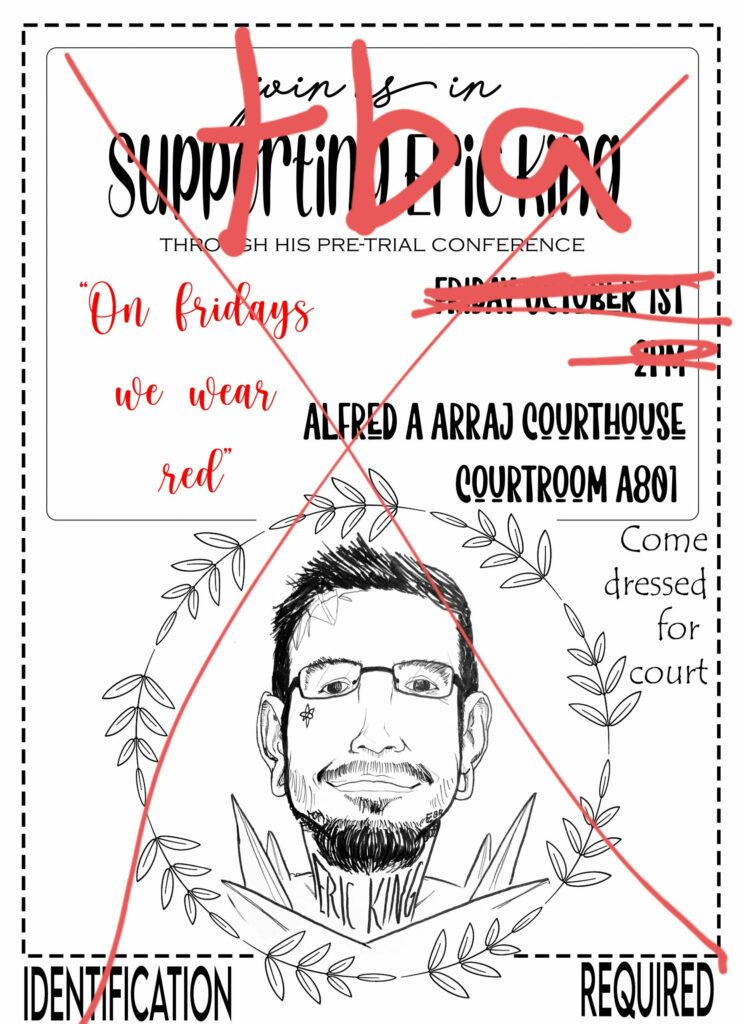
9.26.21 Virtual event
Sponsored by Louisville SURJ – (Showing Up for Racial Justice)
4pm EST
Register at https://bit.ly/LSURJPoliPrisoners
Kazi Toure, Jaan Laaman and Donna Wilmott, former political prisoners in the United States, will discuss Black Liberation, the struggle against white supremacy, anti-imperialism, then and now, and the continuing imprisonment of long-time political prisoners as well as the more recent history across the country in response to the BLM protests.
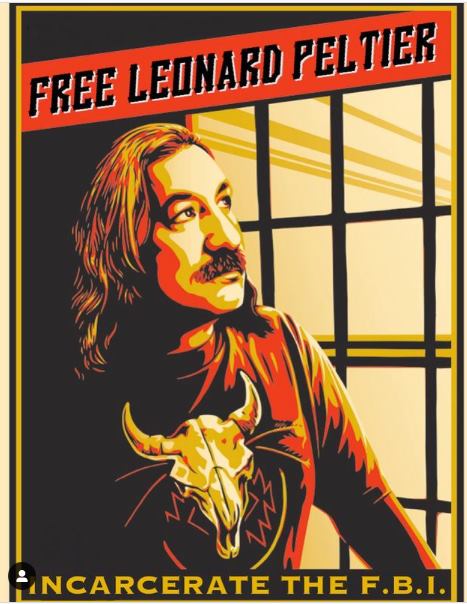
Many of these books get sent to political prisoners who we support thanks to NYC volunteers at Books through Bars.
Our September 2021 Bundle O’ Books is available for another week or so! Order at http://www.freebirdbooks.com/shop.html
These books purchased via our bundle program have helped us keep our shelves chock full of books that are frequently requested by the people in prison and jail who write us. These books fly out of our space weekly as they are books that people often request. I can say that its amazing to not have piles of letters sitting around because we actually have enough of the frequently requested books people ask for.
From our bookstore partner Freebird Books & Goods:
Following August’s drive spotlighting titles from Grove Press–430 books collected!–we take a slightly different approach to the book drive. Rather than feature single titles in the bundle, each purchase will include five works (rather than the usual three) across a range of specialized subjects that Books Through Bars receive request for throughout the year:
– 2 titles from DK’s line of Pocket Genius books (Elements, Sharks, Rocks and Minerals, Dinosaurs, Cars, or Ancient Rome),
– 1 from the National Audubon Society’s pocket field guides (Butterflies, Insects and Spiders, Mammals, Constellations, or Reptiles & Amphibians),
– 1 from the Random House Webster’s line of of pocket reference books (American Sign Language dictionary, Spanish dictionary, grammar usage guide), and
– 1 of Lisa Tenzin-Dolma’s mindfully meditative adult coloring books centered around mandalas.

Save the date: October 12, 2021. Eric’s trial, Denver, Colorado.
More via:
web: https://supportericking.org
fb: https://facebook.com/SupportEricKing/
twitter: https://twitter.com/SupportEricKing
instagram: https://instagram.com/supportericking/
Eric’s lawyers: https://cldc.org
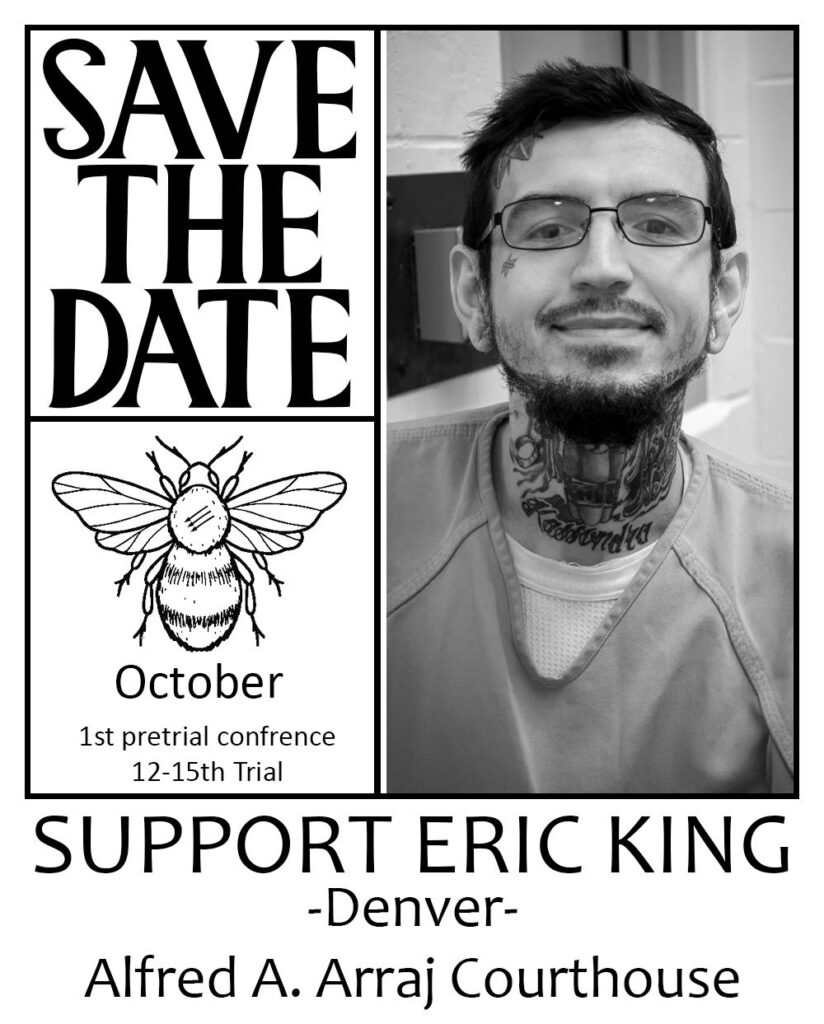
Your support for Sundiata Acoli is crucial to his return home. Tell your friends, colleagues, associates, and neighbors about #BringSundiataHome. We are just shy of our goal. Help us reach 15,000 signatures by sharing the petition!
#BringSundiataHome
It takes less than 2 minutes to fill out the form and WE will send the postcard in the mail. Click the button below and share!
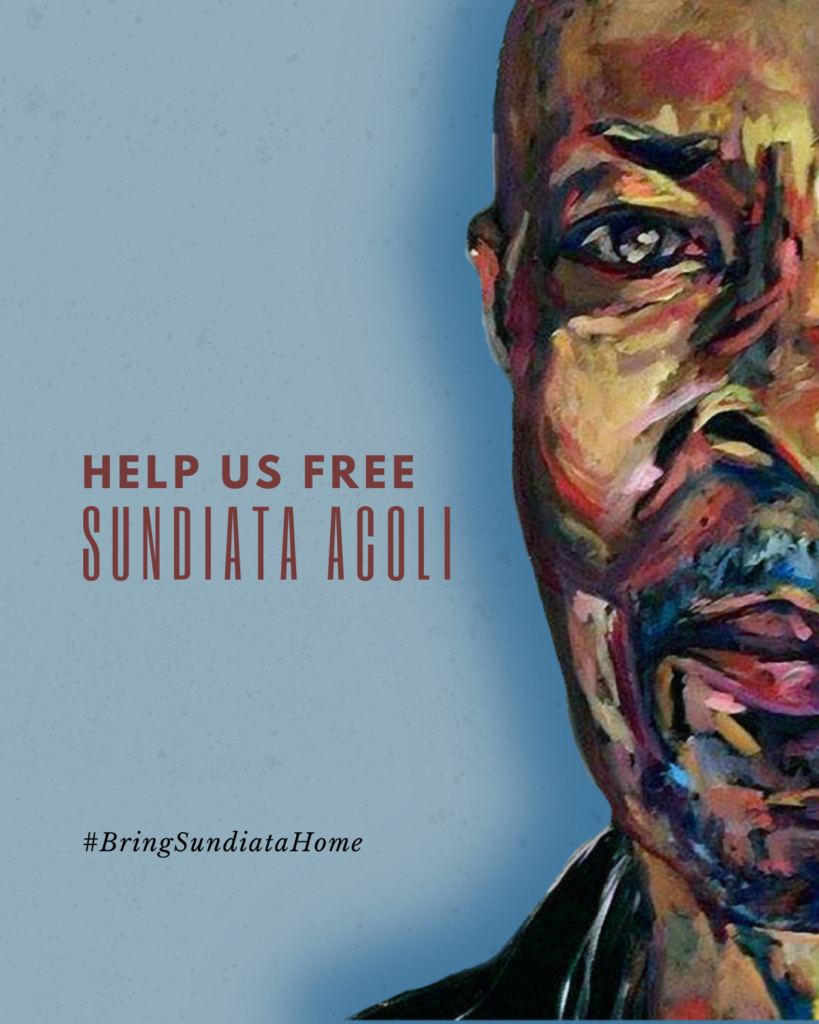
Cops’ support spotlights race issues in ex-Black Panther’s parole case by Hassan Kanu
(Reuters) – An unusual coalition is banding together in a petition to release an 84-year-old former Black Panther convicted for his role in the killing of a police officer.
Sundiata Acoli was sentenced in 1974 to life without the possibility of parole until after 25 years for the first-degree murder of New Jersey state trooper Werner Foerster. The officer was killed in a shootout after he and another trooper stopped Acoli for a defective taillight.
Read more at: https://www.reuters.com/legal/government/cops-support-spotlights-race-issues-ex-black-panthers-parole-case-2021-09-13/.
WHAT: Political Prisoner Letter-Writing
WHEN: 7pm, Tuesday, September 21st, 2021
WHERE: YOUR HOME
COST: Free
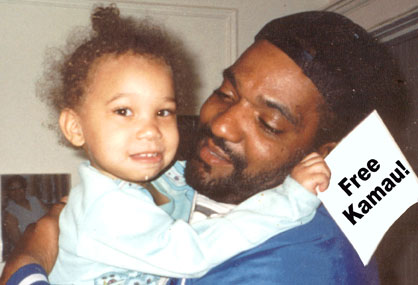
This week, as part of our every-other-week political prisoner letter-writing dinner, NYC ABC and Page One Collective will be writing to Kamau Sadiki, former Black Panther Party member and Black Liberation Army (BLA) soldier who is currently serving a life plus ten years sentence for the murder of an Atlanta cop in 1971. He was arrested and convicted over 30 years after the cop was killed based solely on the testimonies of former BLA comrades-turned-snitch that were not even present at the time of the action.
This should not come as a surprise as the State has never ended their war against Black people and continue to divisively target Black communities. An increased interest in what the State labels terrorism is what led to the increased interest of Kamau in 2002 when he was brought in for questioning on an unrelated matter. They were aware of his former relationship with the perennially Most Wanted Assata Shakur, with whom Kamau has a daughter. They attempted to extract information from him about Assata and tried to recruit him to lure her away from Cuba or else he “would die in prison.” When he refused to turn his back on his principles and his community, the state of Georgia vindictively moved forward with charges of the decades old crime.
Before Kamau’s time in the BLA, he was a New York City teenager who was deeply moved by the principles and organizing efforts of the Black Panther Party. At age 17 he joined up in Jamaica, Queens and volunteered in the Free Breakfast for Children program in the morning, hit the streets with BPP newsletters in the afternoon in an effort to organize his neighbors, and took part in political education classes at night. Once the FBI’s CoIntelPro was in full swing, decimating the Party and their ability to progress, Kamau and many others went underground to the more clandestine BLA for fear of being entrapped, framed, or murdered.
For more info on Kamau Sadiki, check out freekamau.com which gives an account of Kamau’s life from two former political prisoners, Safiya Bukhari and Claude Marks (freedomarchives.org).
Here is an excerpt of Kamau’s 2003 sentencing statement:
“My joining the Black Panther Party and consequently the Black Liberation Army was a response to the oppressive climate that existed in America at the time. The struggle of people of color evolved out of the legacy of slavery and the subsequent Jim Crow laws of the reconstruction period. Following decades of oppression, people of color in this country recognized they had to negotiate their liberation through armed resistance and it was during this period of history that the Black Panther Party and the Black Liberation Army were major players.“
Please take the time to write a letter to Kamau (and share a photo of your completed envelopes with us online):
Kamau Sadiki* #0001150688
Augusta State Medical Prison
3001 Gordon Highway
Grovetown, GA 30813
*Address envelope to Freddie Hilton